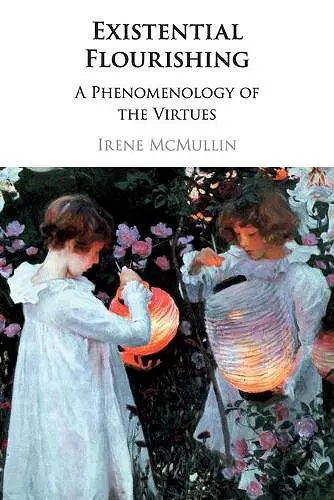Existential Flourishing
A Phenomenology of the Virtues
Format:Paperback
Publisher:Cambridge University Press
Published:21st Jan '21
Currently unavailable, and unfortunately no date known when it will be back
This paperback is available in another edition too:
- Hardback£94.00was £94.00(9781108471664)

Argues that 'flourishing' means balancing one's responsiveness to three normative claims: self-fulfilment, moral responsibility, and intersubjective answerability.
This innovative volume argues that 'flourishing' (eudaimonia) is achieved by individuals successfully balancing their responsiveness to three different normative claims: self-fulfilment, moral responsibility, and answerability to intersubjective standards. It will interest those working in morality, existential phenomenology, and virtue ethics.This innovative volume argues that flourishing is achieved when individuals successfully balance their responsiveness to three kinds of normative claim: self-fulfilment, moral responsibility, and intersubjective answerability. Applying underutilised resources in existential phenomenology, Irene McMullin reconceives practical reason, addresses traditional problems in virtue ethics, and analyses four virtues: justice, patience, modesty, and courage. Her central argument is that there is an irreducible normative plurality arising from the different practical perspectives we can adopt - the first-, second-, and third-person stances - which each present us with different kinds of normative claim. Flourishing is human excellence within each of these normative domains, achieved in such a way that success in one does not compromise success in another. The individual virtues are solutions to specific existential challenges we face in attempting to do so. This book will be important for anyone working in the fields of moral theory, existential phenomenology, and virtue ethics.
'In its overall theory of ethical virtue and in its analyses of specific virtues, Existential Flourishing is an innovative and acutely insightful work of philosophy. The book admirably exemplifies the virtues of sharply analytical ethical theorising that is sensitive to the complex structures of human existence. It is replete with interesting and perceptive thoughts, developed through detailed engagement with landmark classics of analytic moral philosophy and European existential philosophy. Philosophers interested in ethical theory, existential philosophy, or both will want to engage with this book's substantive arguments and its methodology. In this way, anglophone ethical theory can be further enriched by existential philosophy'. Jonathan Webber, The Philosophical Quarterly
'Irene McMullin's Existential Flourishing: A Phenomenology of the Virtues is richly layered and deftly argued. The layers include detailed elucidation of practical rationality, references to previous debates in virtue ethics, and proposals plucked out of Levinas, Nietzsche, Kant, Kierkegaard, Sartre, Heidegger, and Husserl. Despite the heaviness of these many materials, McMullin writes with such dexterity as to encourage light and easy reflection right alongside her lapidary precision. Her style can also be warm and wry, as a line about “considering the moral reprobates that many of us count as friends” attests (143). [...] I am very grateful for this book's insights and for how philosophical argumentation is used to open up explanations of what we are doing. I have shared McMullin's definition of patience with an online group of transplant patient caretakers, who expressed great appreciation for it. Is there a better sign than that?' Jennifer Baker, Ethics
ISBN: 9781108458207
Dimensions: 229mm x 151mm x 14mm
Weight: 387g
258 pages